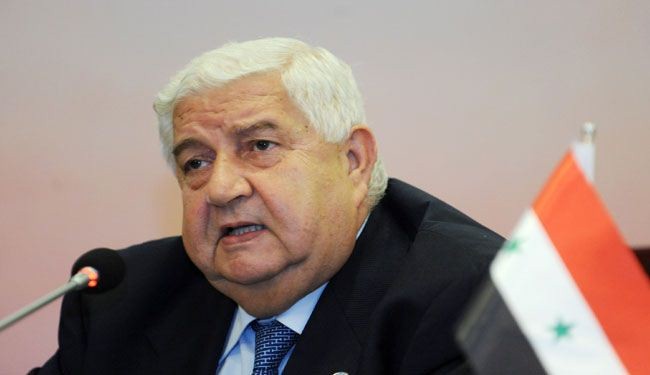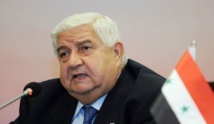In Damascus, the foreign ministry said the "root causes" of the humanitarian crisis must be treated, singling out "foreign-backed terrorism" and sanctions placed on President Bashar al-Assad's regime by Western and Arab countries.
The Security Council, which has been sharply divided over the nearly three-year Syrian conflict, unanimously adopted resolution 2139 on Saturday, calling for humanitarian aid convoys to be allowed access across the war-torn country.
According to the ministry statement, carried by state news agency SANA, Syria is ready to cooperate with the UN mission and international humanitarian organisations "to agree on the implementation of resolution 2139."
It said the resolution must be implemented "with respect for the principles laid out in the UN Charter, international law and the basic foundations of humanitarian work, especially state sovereignty and the role of the state, and principles of neutrality, transparency and non-politicised assistance."
Damascus said the resolution, which condemns terror attacks by Al-Qaeda-linked organisations, was an "admission" by the Security Council of the presence of "extremist Al-Qaeda-linked terrorism" in Syria.
It described the UN condemnation as "a step in the right direction."
Since the March 2011 start of Syria's uprising -- which began as peaceful protests but escalated into a civil war after security forces repeatedly attacked demonstrators -- Assad's regime has blamed the violence on foreign-backed "terrorism."
An estimated 140,000 people have been killed since the start of the uprising and millions more have been displaced.
'Starvation weapon of war'
Syria's staunch ally Russia, with support from China, had blocked three previous resolutions aimed at pressuring the Damascus regime since March 2011.
But Moscow and Beijing, two of the five permanent Security Council members, did not do so this time, sending a strong message to Assad, whose government is accused of serious rights violations.
The Security Council resolution calls on "all parties to immediately lift the sieges of populated areas."
An earlier draft of the resolution had threatened sanctions should Syria fail to comply, but Russia refused and distributed a draft of its own, which included the language on "fighting terrorism" in Syria.
The resolution is the second Security Council decision since Syria's war began. It follows a decision ordering the destruction of Syria's chemical arsenal, after an August 21, 2013 chemical attack near Damascus killed hundreds of people.
Nadim Houry, a Middle East deputy director of Human Rights Watch, said the resolution was "a political breakthrough but words will not feed Syrians in desperate need of food."
Without the threat of sanctions, "it is up to Syria's allies, particularly Russia and Iran, to ensure that the Syrian government gets the message, and stops using the starvation of civilians as a weapon of war," he said.
Reflecting scepticism on the ground, an activist from Douma near the Syrian capital told AFP: "We would really like humanitarian corridors to become a reality. But I really doubt it, especially as the resolution doesn't mention sanctions."
On the international scene, a Saudi source said Riyadh was seeking Pakistani arms for the Syrian rebels it supports in the wake of the failure of Geneva peace talks earlier this month.
The source, requesting anonymity, pointed to a visit to Riyadh earlier this month by Pakistan's army chief of staff, General Raheel Sharif, who met Crown Prince Salman bin Abdul Aziz.
Pakistan manufactures shoulder-launched anti-aircraft missiles, known as Anza, and anti-tank rockets -- both of which Riyadh is trying to get for the rebels, said the source, who is close to Saudi decision-makers.
In the latest violence, a car bomb explosion hit a hospital on Syria's border with Turkey on Sunday, killing two people and wounding several more, a monitoring group said.
The Syrian Observatory for Human Rights said the blast struck close to Orient hospital near the rebel-held border town of Atmeh.
And a prominent rights lawyer, Anwar Bunni, said his brother Akram, a dissident writer and journalist, was arrested by the security forces in Damascus on Saturday.
------------------------------------------------------------------
The Security Council, which has been sharply divided over the nearly three-year Syrian conflict, unanimously adopted resolution 2139 on Saturday, calling for humanitarian aid convoys to be allowed access across the war-torn country.
According to the ministry statement, carried by state news agency SANA, Syria is ready to cooperate with the UN mission and international humanitarian organisations "to agree on the implementation of resolution 2139."
It said the resolution must be implemented "with respect for the principles laid out in the UN Charter, international law and the basic foundations of humanitarian work, especially state sovereignty and the role of the state, and principles of neutrality, transparency and non-politicised assistance."
Damascus said the resolution, which condemns terror attacks by Al-Qaeda-linked organisations, was an "admission" by the Security Council of the presence of "extremist Al-Qaeda-linked terrorism" in Syria.
It described the UN condemnation as "a step in the right direction."
Since the March 2011 start of Syria's uprising -- which began as peaceful protests but escalated into a civil war after security forces repeatedly attacked demonstrators -- Assad's regime has blamed the violence on foreign-backed "terrorism."
An estimated 140,000 people have been killed since the start of the uprising and millions more have been displaced.
'Starvation weapon of war'
Syria's staunch ally Russia, with support from China, had blocked three previous resolutions aimed at pressuring the Damascus regime since March 2011.
But Moscow and Beijing, two of the five permanent Security Council members, did not do so this time, sending a strong message to Assad, whose government is accused of serious rights violations.
The Security Council resolution calls on "all parties to immediately lift the sieges of populated areas."
An earlier draft of the resolution had threatened sanctions should Syria fail to comply, but Russia refused and distributed a draft of its own, which included the language on "fighting terrorism" in Syria.
The resolution is the second Security Council decision since Syria's war began. It follows a decision ordering the destruction of Syria's chemical arsenal, after an August 21, 2013 chemical attack near Damascus killed hundreds of people.
Nadim Houry, a Middle East deputy director of Human Rights Watch, said the resolution was "a political breakthrough but words will not feed Syrians in desperate need of food."
Without the threat of sanctions, "it is up to Syria's allies, particularly Russia and Iran, to ensure that the Syrian government gets the message, and stops using the starvation of civilians as a weapon of war," he said.
Reflecting scepticism on the ground, an activist from Douma near the Syrian capital told AFP: "We would really like humanitarian corridors to become a reality. But I really doubt it, especially as the resolution doesn't mention sanctions."
On the international scene, a Saudi source said Riyadh was seeking Pakistani arms for the Syrian rebels it supports in the wake of the failure of Geneva peace talks earlier this month.
The source, requesting anonymity, pointed to a visit to Riyadh earlier this month by Pakistan's army chief of staff, General Raheel Sharif, who met Crown Prince Salman bin Abdul Aziz.
Pakistan manufactures shoulder-launched anti-aircraft missiles, known as Anza, and anti-tank rockets -- both of which Riyadh is trying to get for the rebels, said the source, who is close to Saudi decision-makers.
In the latest violence, a car bomb explosion hit a hospital on Syria's border with Turkey on Sunday, killing two people and wounding several more, a monitoring group said.
The Syrian Observatory for Human Rights said the blast struck close to Orient hospital near the rebel-held border town of Atmeh.
And a prominent rights lawyer, Anwar Bunni, said his brother Akram, a dissident writer and journalist, was arrested by the security forces in Damascus on Saturday.
------------------------------------------------------------------









 Home
Home Politics
Politics











